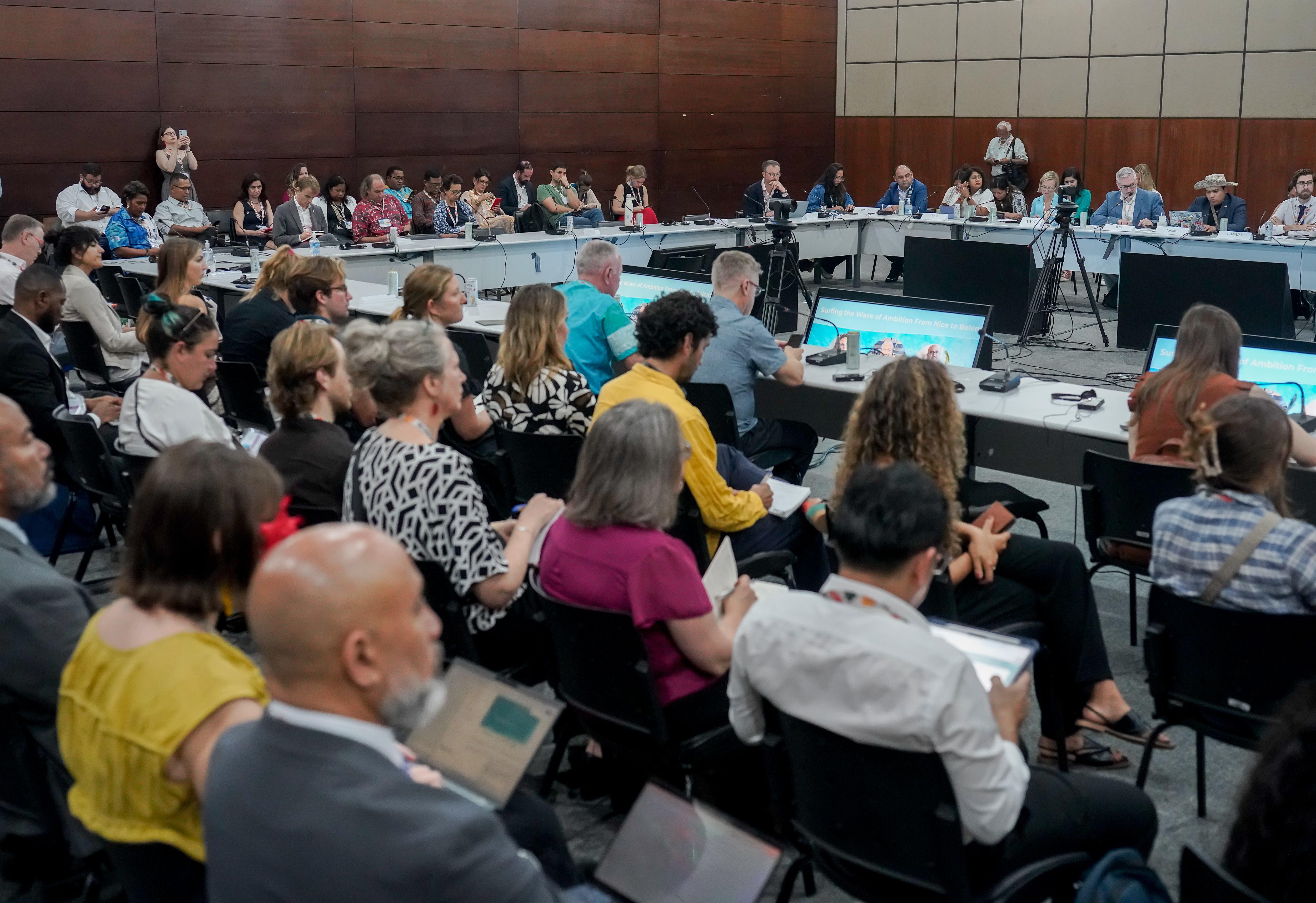Brazil and France announce Ocean Task Force as new countries join global ocean effort
Initiative led by Brazil and France integrates oceans into a global mechanism to accelerate the incorporation of marine solutions into national climate plans

By Rafaela Ferreira/COP30
On Tuesday, 18 November, a Task Force on Oceans was unveiled during a high-level ministerial meeting at COP30. Led by Brazil and France, the initiative integrates oceans into a global mechanism that accelerates the adoption of marine solutions in national climate plans. It also builds on the work of the Blue Nationally Determined Contributions (NDC) Challenge, which encourages countries to set ocean protection targets when updating their NDCs.
At the ministerial meeting, titled "From Ambition to Implementation: Delivering on Ocean Commitments," countries highlighted their intentions to transform the Blue NDC Challenge into an Implementation Task Force, reaffirming the importance of international collaboration and the strengthening of multilateralism. Additionally, the Action Agenda Blue Package was also disclosed, an initiative that represents an unprecedented advance with the structural integration of the ocean into the climate agenda.
On the occasion, it was also announced that 17 countries have already committed to incorporating the ocean into their updated climate plans. Besides Brazil and France, Australia, Fiji, Kenya, Mexico, Palau, the Republic of Seychelles, Chile, Madagascar, and the United Kingdom had already joined the initiative. During the event, six other countries—Belgium, Cambodia, Canada, Indonesia, Portugal, and Singapore—joined the Challenge, expanding the coalition.
The National Secretary for Climate Change at Brazil's Ministry of the Environment and Climate Change (Ministério do Meio Ambiente e Mudanças do Clima/ MMA) do Brasil, Mr. Aloisio de Melo, recalled that the Brazilian NDC integrated, for the first time, ocean-based solutions, such as ProManguezal and ProCoral. “These measures reflect our conviction that the ocean must be fully recognized as a pillar of global climate ambition,” he stated.
“We also welcome the growing number of countries that have incorporated oceanic measures into their NDCs. This is something new, something to be celebrated. The most recent NDC, as reported, shows a clear trend, and the unprecedented commitment expressed during the COP30 leaders' summit, approximately 10 days ago, reinforced this momentum. Never before have so many heads of state aligned so clearly on the need to place the ocean at the heart of the global climate response,” the secretary concluded.
Ms. Loreley Picourt, Executive Director of the Ocean and Climate Platform, highlighted that the unity of the countries will transform the Blue NDC Challenge into an Implementation Task Force. "We heard the call loud and clear for the ocean to be included and reflected in the final COP30 document, as well as the path forward for COP31. The Blue Package serves as a clear roadmap for moving from the global ambition of ocean advancements to concrete implementation on the ground."
Blue NDC Challenge
Nations adhering to the initiative commit to working together to reduce greenhouse gas emissions and enhance climate resilience through ocean-based solutions. These actions aim to provide benefits for both nature and populations, aligning with global mitigation and adaptation goals.
The Challenge was launched during the 3rd UN Ocean Conference (UNOC3) in Nice, France, in June of this year. For the Climate Ambassador of France, Benoit Faraco, UNOC 3 demonstrated that multilateralism works. "It not only boosted climate ambition regarding oceans but also led to the rapid ratification of the High Seas Treaty. Now, it is up to us to implement these commitments here at COP30, thanks to the French-Brazilian partnership and the call for 'Blue Nationally Determined Contributions' (NDCs), which give the ocean a central role in our fight against the climate crisis."
In accordance with each country's national context, members of the Blue NDC Challenge can adopt a broad set of actions aimed at the protection and sustainable use of the oceans. These measures include the sustainable management, conservation, and restoration of coastal and marine ecosystems, supported by instruments such as marine spatial planning, integrated coastal zone management, and the creation of climate-aligned marine protected areas.
In the same context, countries are encouraged to support sustainable and climate-resilient fishing and aquaculture, ensuring ocean health and long-term food security.
Brazilian NDC
Brazil's new NDC, with targets for 2035 for reducing greenhouse gas emissions (mitigation) and adaptation to climate change, has a chapter dedicated to the ocean and coastal zone. The document highlights that the Climate Plan (Plano Clima), which guides climate change response actions in the country until 2035, will include a Thematic Adaptation Plan for the two topics for the first time.
Among the Plan's goals is the completion of Marine Spatial Planning (PEM) elaboration by 2030, intending to order human activities at sea in an integrated and sustainable manner, and Integrated Coastal Zone Management, to promote the efficient management of coastal ecosystems. Furthermore, programs like ProManguezal and ProCoral will be implemented, which target the conservation and recovery of mangroves and coral reefs, respectively.
Present at the ministerial event, the Mayor of the municipality of Augusto Corrêa (PA), Mr. Francisco de Oliveira, emphasized the importance of seeking a balance between protection and, at the same time, ensuring the sustainability of traditional Amazonian peoples. "We have a large mangrove area in our state, and it absorbs six times more carbon than the terrestrial forest. It is cheaper for us to protect it than to recover it. Local leaders have the knowledge, and together with the communities, we need financing and resources to execute the services," he said.
English version: Trad. Bárbara Menezes.
Proofreading by Enrique Villamil.
